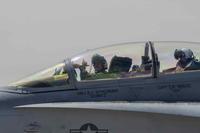Just days after Russia's deputy prime minister suggested the country was walking away from its partnership with the U.S. on space, a Russian rocket carrying one of the country's most advanced satellites disintegrated after launch.
A Proton-M rocket carrying the Express-AM4R communications satellite failed about nine minutes after lifting off Friday from the Baikonur Cosmodrome in Kazakhstan, according to a report by the state-owned news organization RT. Most of the booster and toxic fuel were believed to have burned up in the atmosphere.
Oleg Ostapenko, the head of the Russian space agency Roscosmos, told the news outlet that officials are still studying the telemetry to better understand what caused the crash, but "preliminary information points to an emergency pressure drop in a steering engine of the third stage of the rocket."
The booster was about 100 miles above Earth and less than a minute away from delivering its payload -- described as Russia's most advanced and powerful communications satellite designed to provide TV and broadband services -- when contact was lost. A similar satellite was lost in 2011 when another Proton-M placed it in the wrong orbit.
%embed1%
The failure occurred three days after Dmitry Rogozin, the deputy prime minister who heads up the defense and space industries, indicated that Russia plans to stop supplying the U.S. with its RD-180 rocket engine, which is used to launch military and spy satellites for the Defense Department.
He also tweeted that Russia "doesn't plan to continue cooperation" with the U.S. on the International Space Station after 2020 — four years earlier than planned — and that it would deactivate sites of the U.S.-managed GPS system in the country.
In a post on his Twitter account on Friday, he alluded to the rocket failure: "The only way to counter accidents is to consistently carry out the decisions taken to reform our rocket and space industry."
His previous messages were viewed as retaliation against U.S. sanctions levied in response to Russia's invasion and subsequent annexation of the Ukraine’s Crimea this year. Rogozin was on a list of Russian officials targeted in March by the White House for economic sanctions.
The RD-180 engine is made by the Russian company NPO Energomash and used by a Lockheed Martin Corp.-Boeing Co. joint venture, known as United Launch Alliance LLC, as a first-stage engine on its Atlas V rocket as part of the Air Force's Evolved Expendable Launch Vehicle program.
Space Exploration Technologies Corp., known as SpaceX and headed by billionaire Elon Musk, has raised objections to American reliance on Russia for access to space in its quest to compete in the military market. It recently sued the Air Force to open more of its launches to competition.
A judge in the case issued a temporary injunction preventing the U.S. government from buying the Russian engine, though later lifted the order after federal agencies certified the payments didn’t violate sanctions against Rogozin.
The Lockheed-Boeing joint venture has blamed SpaceX's "irresponsible actions" for having "created distractions, threatened U.S. military satellite operations, and undermined our future relationship with the International Space Station."
As for Russia's Proton-M rocket, all launches from Baikonur have been suspended while investigators determine the cause of the failure, according to RT. The Voronezh manufacturing plant, which produces the Briz-M third-stage engine, has launched a separate probe into the incident, the news organization reported.









